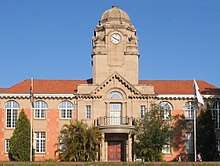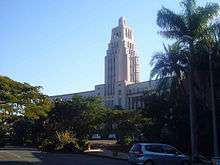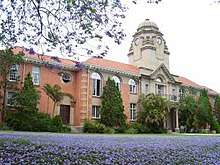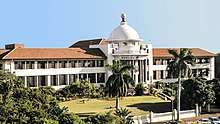University of KwaZulu-Natal
 | |
| Motto | Inspiring Greatness |
|---|---|
| Established | 1 January 2004 as merger of UN (est. 1910) and UDW (est. 1960s)[1] |
| Chancellor | Mogoeng Mogoeng |
| Vice-Chancellor | Dr. Albert van Jaarsveld |
Academic staff | 1,328[2] (2016) |
| Students | 46,539[2] (2016) |
| Undergraduates | 24,897[3] (2007) |
| Postgraduates | 3,807[3] (2007) |
| Location | Durban, Westville, Pinetown and Pietermaritzburg[1], KwaZulu-Natal[1], South Africa[1] |
| Campus | 5 campuses[4] |
| Colours | Black and red |
| Website | www.ukzn.ac.za |
The University of KwaZulu-Natal or UKZN is a university with five campuses in the province of KwaZulu-Natal in South Africa.[4] It was formed on 1 January 2004 after the merger between the University of Natal and the University of Durban-Westville.[1]
History
The university was formed by the merger of the University of Natal and the University of Durban-Westville, in 2004.

University of Natal
University of Durban-Westville

Organization
The university is governed in accordance with the Higher Education Act of 1997,[5] and its constitution is specified in the Statute of the University of KwaZulu-Natal,[6] as approved by the South African Minister of Education and the Parliament of South Africa.
In the statute, the university consists of:
- the chancellor (the titular head). The first chancellor of the merged university was Dr Frene Ginwala. It is currently Chief Justice Mogoeng Mogoeng.
- the vice chancellor (the executive head)
- two or more deputy vice chancellors (currently there are five full and one acting)[7]
- the registrar (responsible for registering students)
- the council (responsible for governance of the institution as a whole)
- the senate (responsible for governance of academic activities)
- the students representative council (responsible for students representation)
- the institutional forum (responsible for advising the council on matters of human rights and equality)
- the colleges (currently there are four)
- the academic and support staff
- the students
- the convocation (all the alumni and some others)
Academic structure
The university is made up of four colleges, which are in turn made up of several schools.[8] In most cases, a subdivision is spread across one or more of the university's campuses. For example, the Chemistry is in both the Pietermaritzburg and Westville campuses.[9]
College of Agriculture, Engineering and Science
- School of Engineering
- School of Agricultural, Earth and Environmental Sciences
- School of Chemistry and Physics
- School of Life Sciences
- School Mathematics, Statistics and Computer Science
College of Health Sciences
- School of Clinical Medicine
- School of Laboratory Medicine and Medical Sciences
- School of Health Sciences
- School of Nursing and Public Health
College of Humanities
- School of Religion, Philosophy and Classics
- School of Arts
- School of Social Sciences
- School of Applied Human Sciences
- School of Built Environment and Development Studies
- School of Education
College of Law and Management Studies
- Graduate School of Business and Leadership (Business Management Association in cooperation with Hampton College Durban)
- School of Accounting, Economics and Finance
- School of Law
- School of Management, IT and Governance
An institute built in cooperation with the Howard Hughes Medical Institute is the new KwaZulu-Natal Research Institute for Tuberculosis and HIV, opened in 2012. It is on the Nelson Mandela School of Medicine campus.
Campuses
The university is geographically divided into five distinct campuses,[10] which partially correspond to its managerial and academic divisions. Two campuses (Edgewood and the Medical School) house specific academic divisions (education and medicine respectively), but the remainder of the university's academic divisions span Howard College, Pietermaritzburg and Westville.
Pietermaritzburg campus

Pietermaritzburg campus was the main location of the University of Natal and its predecessor, the Natal University College, until the opening of the Howard College campus in Durban. This campus contains the university's oldest structure, Old Main Building, built in 1912.[10] Pietermaritzburg campus offers a broad range of academic degrees and is the only UKZN campus providing training in agriculture, theology and fine arts.[10]
Howard College campus

Howard College campus was the Durban location of the University of Natal until the 2004 merger. It spans the Berea Ridge. and is situated in a thriving environmental conservancy. The campus was opened in 1931, having been donated by Mr T. B. Davis, in honor of his son, Howard Davis, who died in the Battle of the Somme during the first world war.[11] Howard College offers a wide range of degrees, with a large engineering department consisting of Electrical engineering and Chemical engineering. The College of Humanities and College of Law and Management are also positioned on this campus together with the Centre For Creative Arts (CCA) and the Elizabeth Sneddon Theatre which host annually the Durban International Film Festival (DIFF), Poetry Africa, Time of the Writer and the creative dance festival JOMBA! which is produced by the FlatFoot Dance company.
Westville campus

Westville campus is in an environmental conservancy in Westville, about 20 km West of Durban.[10] It was formerly the site of the University of Durban-Westville before the 2004 merger. Westville offers a range of degrees, and will soon be the main home of the disciplines of commerce and management.[10]
Nelson Mandela medical school
Nelson Mandela medical school campus, created in 1950, was originally a racially segregated part of the University of Natal.[10] It was one of the few tertiary institutions legally allowed to provide education to black people under apartheid. It was granted Nelson Mandela's name on its 50th anniversary in 2000. The medical school is the home of health sciences.
Edgewood campus
Edgewood campus is located in Pinetown, east of Durban. The buildings originally formed the Edgewood College of Education, which was incorporated into the University of Natal in 2001.[10] Edgewood is the main location of the university's Faculty of Education.[10]
Student life
UKZN is home to various student organizations such as debating unions, film clubs, poetry societies, and sports teams.
The UKZN Rugby team - The UKZN Impi - features in the highly contested Varsity Cup national rugby competition, and the Howard College Debating Union competes in both the World Universities Debating Championships[12] as well as the South African National Universities Debating Championships.
UKZN established the Centre for Creative Arts (CCA) in 1996[13]. The CCA is a multi-disciplinary arts organisation based within the School of Arts at the University of KwaZulu-Natal. It coordinates several respected annual festivals, providing students with access to creative platforms and interesting opportunities aimed at developing their artistic talents. The four main festivals organized by the UKZN CCA are:
- Time of the Writer[14]
The UKZN Time of the Writer festival invites international authors to take place in a variety of roundtable discussions, readings, seminars, book launches, and developmental programs such as workshops, master classes and motivational talks. The festival has been running since 1998.
First held in 1979, The Durban International Film Festival is one of the oldest and largest film festivals in southern Africa.[16]
- JOMBA! Contemporary Dance Experience[17]
The UKZN Poetry Africa started in 1997, and features performances, readings, and book-launches from some poets
Law Clinics
UKZN has two law clinics, one in Pietermaritzburg and one in Durban, that provide free legal assistance to those that are unable to afford it. Specializing in the areas of HIV and AIDS, Family Law, and social justice matters, the UKZN law clinics are considered to be among the leading law clinics in the country.[19] The law clinics also provide a practical training environment for final year law students, who are mentored by the clinic's experienced practitioners. Both clinics also engage directly with the communities throughout the province through regular outreach initiatives, where the students and legal practitioners travel to various remote, impoverished communities with the intention of providing access to justice for those that are most vulnerable.
Ranking
UKZN was ranked fourth out of the universities in South Africa by the Times Higher Education World University Rankings[20] and sixth by the QS World University Rankings 2018[21]. UKZN has historically had a very strong reputation in the areas of science, technology, engineering, and mathematics, and is ranked first in the country for physical sciences and engineering, second for computer science, and third for mathematics[22].
Internationally, UKZN is ranked in the 401-500 bracket by the Times Higher Education World University Rankings, and in the 701-750 bracket by the QS World University Rankings 2018[23][24]
Controversies
There have been a number of controversies at the University of KwaZulu-Natal since its foundation.
Firstly, there have been several staff strikes and student protests,[25][26][27][28][29] with some protests from 2009 onward involving police intervention and the use of riot control measures, as well as violence on the part of some strikers.[30][31]
Secondly, there have been a series of legal and disciplinary actions taken by senior university management against academics for speaking in public about the university.[32][33][34][35] These actions have drawn wide criticism from academics and from organisations such as Cosatu and UNESCO.[36]
They were also the cause of a 2008 staff strike.[25]
Notable alumni
- Imani Sanga, composer and ethnomusicologist
- Lize Heerman, singer-songwriter and media personality
As the university has only existed since 2004, very few of its graduates have yet to attain great fame. There are, however, numerous notable alumni of its founding institutions:
University of Durban-Westville
- Malusi Gigaba, Minister of Home Affairs in South Africa
- Pravin Gordhan, former Minister of Finance in South Africa
- Roy Padayachie, former Minister of Public Service and Administration in South Africa
- Gerald Pillay, Vice-Chancellor Liverpool Hope University
University of Natal
|
See also
References
- 1 2 3 4 5 6 "History of the University of KwaZulu-Natal". University of KwaZulu-Natal. Archived from the original on 20 August 2011. Retrieved 28 August 2011.
- 1 2 "University of KwaZulu Natal Annual Report 2016" (PDF). University of KwaZulu-Natal. Retrieved 10 April 2018.
- 1 2 "University of KwaZulu Natal". Southern African Regional Universities Association. Retrieved 27 August 2011.
- 1 2 "Choice of campuses". University of KwaZulu-Natal. Archived from the original on 22 December 2007. Retrieved 18 November 2007.
- ↑ Parliament of South Africa (1997). "Higher Education Act" (PDF). Government Gazette. 390 (18515). Archived from the original (PDF) on 25 July 2008.
- ↑ Parliament of South Africa (2005). "Statute of the University of KwaZulu-Natal" (PDF). Government Gazette. 684 (29032).
- ↑ University of KwaZulu-Natal. "Executive of the University of KwaZulu-Natal". Archived from the original on 18 December 2008. Retrieved 9 February 2016.
- ↑ UKZN. "Schools". Archived from the original on 25 January 2012. Retrieved 3 February 2012.
- ↑ UKZN. "School of Chemistry". Retrieved 26 August 2011.
- 1 2 3 4 5 6 7 8 "About UKZN". UKZN. Archived from the original on 17 August 2011. Retrieved 26 August 2011.
- ↑ "University of KwaZulu-Natal". University of KwaZulu-Natal. 3/01/2018. Retrieved https://www.ukzn.ac.za/about-ukzn/campuses/. Check date values in:
|access-date=, |date=(help) - ↑ "ukzn-graduate-a-judge-at-international-debating-championships".
- ↑ "UKZN Centre for Creative Arts". http://www.cca.ukzn.ac.za/index.php/about-cca. External link in
|website=(help) - ↑ "UKZN Time of the Writer".
- ↑ "UKZN Durban International Film Festival".
- ↑ "Durban International Film Festival". Archived from the original on 2012-07-04.
- ↑ "UKZN Jomba".
- ↑ "UKZN Poetry Africa".
- ↑ "UKZN Law Clinic".
- ↑ "University of KwaZulu-Natal". Times Higher Education (THE).
- ↑ "Top 10 Universities in South Africa 2018". QS World University Rankings 2018.
- ↑ "South Africa's best universities to study maths, science and technology". BusinessTech.
- ↑ "University of KwaZulu-Natal". Times Higher Education (THE).
- ↑ "University of KwaZulu-Natal". QS World University Rankings 2018.
- 1 2 Dell, Sharon (14 November 2008). "UKZN staff prepare for strike". The Witness. Retrieved 26 August 2011.
- ↑ Mbonambi, Gugu (9 March 2010). "March disrupts lectures on KZN campus". The Mercury. Retrieved 26 August 2011.
- ↑ Subramoney, Thrishni (9 September 2011). "UKZN management to take action against strike". East Coast Radio. Archived from the original on 28 September 2011. Retrieved 26 August 2011.
- ↑ Ndlovu, Sinegugu (31 March 2011). "Campus turns into battlefield". The Mercury. Retrieved 26 August 2011.
- ↑ "Campus turns into battlefield". Sapa. 30 March 2011. Retrieved 26 August 2011.
- ↑ "UKZN Student Protest Turns Ugly". The Mercury. 24 March 2009. Retrieved 26 August 2011.
- ↑ MAGWAZA, NOMPUMELEL (24 March 2009). "Blind student hurt as protest turns ugly". The Mercury. Archived from the original on 21 November 2012. Retrieved 26 August 2011.
- ↑ McKune, Craig (20 January 2009). "Management shows contempt for academic freedom at UKZN". South African Journal of Science. Retrieved 8 December 2008.
- ↑ "FXI distressed by disciplinary action against two UKZN Professors". NTSEU. Archived from the original on 16 March 2012. Retrieved 26 August 2011.
- ↑ Gower, PRIMARASHNI (15 March 2008). "UKZN academics question senate probe". Mail and Guardian. Retrieved 26 August 2011.
- ↑ "Controversy and transformation at UKZN". Science and Development Network. Retrieved 26 August 2011.
- ↑ Hlongwane, Agiza (7 December 2008). "Clean up your act, UKZN warned". Sunday Tribune. p. 1. Retrieved 8 December 2008.
- ↑ "Stephen Bantu Biko". South African history online. September 2007. Retrieved 20 November 2007.
- ↑ "Mark Bristow: the man least likely to suffer when gold loses its lustre". The Guardian. 6 May 2011. Retrieved 26 November 2012.
- ↑ Y. K. Seedat, "Soromini Kallichurum: A South African Medical Icon and a Fearless Protector of Students During Apartheid" British Medical Journal 326(7386)(22 February 2003): 450.
- ↑ "NB Publishers | Our Authors | DJ Opperman". www.nb.co.za. Retrieved 2016-02-10.
- ↑ "DA shadow cabinet - full list of names".
External links
| Wikimedia Commons has media related to University of KwaZulu-Natal. |
- Official website
- Fight for Fazel Khan – Union Leader Fired from UKZN in 2006
- Freedom of Expression Institute website
- Official UKZN twitter
- UKZN Press website
- "Digital Innovation South Africa". University of KwaZulu-Natal. OCLC 225596326.
National collaborative...resource containing historical material of importance and interest to scholars and students
. Disa.ukzn.ac.za. Formerly known as "Digital Imaging South Africa"
Coordinates: 29°52′03″S 30°58′51″E / 29.86752°S 30.98081°E